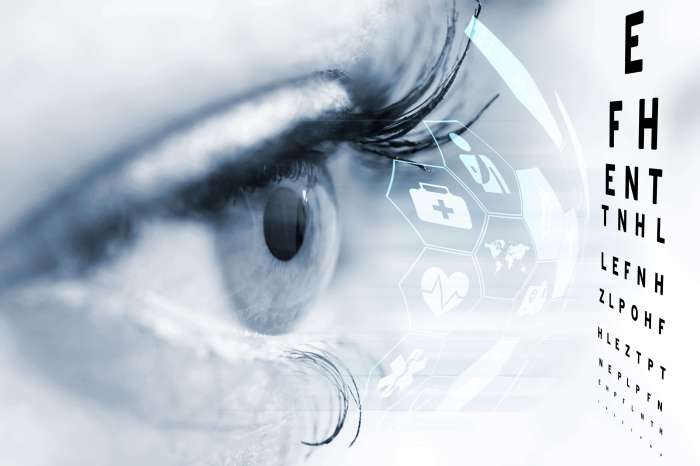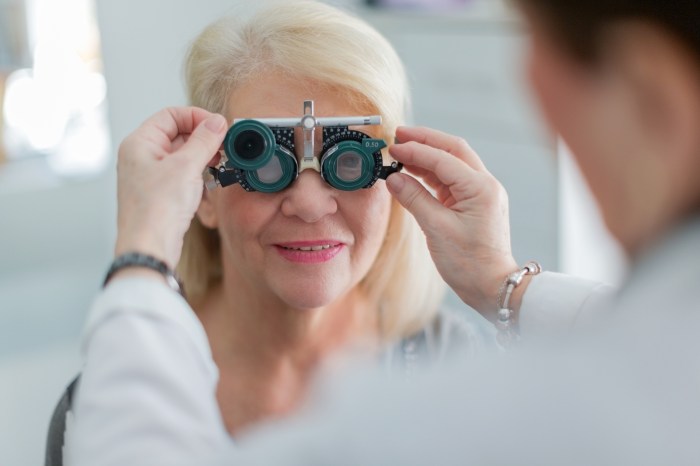
Exploring the realm of Healthcare services for vision care, this introduction aims to provide a detailed insight into the importance of eye health and the various services available to maintain optimal vision. From routine check-ups to specialized treatments, this guide covers everything you need to know to take care of your eyes effectively.
As we delve deeper into the specifics of vision care services, you will discover valuable information on common eye conditions, the role of healthcare professionals, and the significance of early detection and treatment. Let’s embark on this journey towards better eye health together.
Healthcare Services for Vision Care
Regular eye check-ups are essential for maintaining overall health, as they can help detect early signs of eye diseases, vision problems, and other health conditions like diabetes and hypertension. These check-ups play a critical role in preventing vision loss and ensuring proper eye health.
Common Vision Problems Requiring Professional Care
- Refractive Errors: Includes nearsightedness, farsightedness, and astigmatism, which can be corrected with prescription glasses or contact lenses.
- Cataracts: Clouding of the eye’s lens, which may require surgery to remove and replace the lens.
- Glaucoma: Damage to the optic nerve due to increased eye pressure, often requiring ongoing treatment to prevent vision loss.
Role of Optometrists and Ophthalmologists
Optometrists are primary eye care providers who perform eye exams, prescribe corrective lenses, and diagnose common eye conditions. Ophthalmologists are medical doctors who specialize in eye care, perform surgeries, and treat more complex eye conditions and diseases.
Types of Vision Care Services Available
- Eye Exams: Comprehensive evaluations to assess vision and eye health.
- Prescription Glasses: Corrective lenses to improve vision clarity.
- Contact Lenses: Alternative to glasses for vision correction.
- Surgery: Procedures like LASIK for vision correction or cataract removal.
Medical Care for Eye Health
Receiving medical care for eye-related issues typically involves a series of steps to diagnose and treat conditions affecting the eyes. It is essential to seek timely medical attention for any eye problems to prevent complications and maintain good vision.
Importance of Early Detection and Treatment
Early detection and treatment of eye conditions are crucial in preserving vision and preventing irreversible damage. Regular eye exams can help identify problems early on and allow for timely intervention to manage or correct any issues.
- Regular eye exams can detect conditions like glaucoma, cataracts, and macular degeneration early, improving the chances of successful treatment.
- Timely intervention can prevent vision loss and improve the quality of life for individuals with eye conditions.
- Early treatment can also help in managing chronic conditions like diabetic retinopathy and preserving overall eye health.
Common Medical Treatments for Eye Diseases or Injuries
Medical treatments for eye diseases or injuries may vary depending on the specific condition. Some common treatments include:
- Medication:Eye drops, ointments, or oral medications may be prescribed to manage infections, inflammation, or conditions like dry eyes.
- Surgery:Procedures such as cataract surgery, laser eye surgery, or corneal transplants may be recommended to correct vision problems or treat certain eye conditions.
- Therapy:Vision therapy or rehabilitation programs may be used to improve visual skills, correct eye muscle imbalances, or aid in recovery from certain eye injuries.
Role of Medication, Surgery, and Therapy in Maintaining Eye Health
Medication, surgery, and therapy play vital roles in maintaining eye health by addressing various eye conditions and ensuring optimal visual function. These interventions can help individuals manage eye diseases, correct vision problems, and enhance overall quality of life.
- Medication can help control symptoms, reduce inflammation, and prevent infections in the eyes.
- Surgery can correct refractive errors, remove cataracts, repair retinal detachments, or treat other structural issues affecting the eyes.
- Therapy programs can improve visual acuity, enhance eye coordination, and aid in the rehabilitation of individuals with vision impairments.
Health Insurance Coverage for Vision Care
When it comes to vision care, understanding your health insurance coverage is crucial for managing your eye health effectively. Most health insurance plans provide coverage for a range of vision care services, but it’s important to know exactly what is included in your plan.
Types of Vision Care Services Covered by Health Insurance Plans
- Regular eye exams
- Prescription eyeglasses or contact lenses
- Treatment for eye conditions or diseases
- Surgeries or procedures related to eye health
How to Navigate Insurance Coverage for Vision Care Procedures
It’s essential to review your health insurance policy and understand the specific details related to vision care coverage. Contact your insurance provider to clarify any doubts and ensure you are utilizing your benefits effectively.
Comparing Different Health Insurance Plans for Vision Care Benefits
When choosing a health insurance plan, compare the vision care benefits offered by different providers. Look for plans that cover a wide range of services and provide adequate financial support for your vision care needs.
Tips for Maximizing Health Insurance Coverage for Vision Care Services
- Schedule regular eye exams to detect any issues early on
- Use in-network providers to minimize out-of-pocket costs
- Take advantage of flexible spending accounts or health savings accounts for vision care expenses
- Understand your plan’s coverage limitations and exclusions
Medical Research in Vision Care
Medical research in the field of vision care plays a crucial role in advancing treatments and improving eye health. By exploring recent advancements and ongoing studies, we can better understand the significance of research in this area.
Advancements in Gene Therapy for Retinal Diseases
Recent studies have shown promising results in the development of gene therapies for retinal diseases such as retinitis pigmentosa and age-related macular degeneration. Gene therapy involves delivering healthy genes to replace mutated ones, offering potential long-term solutions for these conditions.
Use of Artificial Intelligence in Diagnosing Eye Conditions
Artificial intelligence (AI) technologies are being increasingly utilized to enhance the accuracy and speed of diagnosing eye conditions. Machine learning algorithms can analyze medical images to detect signs of diseases like diabetic retinopathy or glaucoma, allowing for earlier intervention and treatment.
Advancements in Corneal Transplant Techniques
Ongoing research is focused on improving corneal transplant techniques to enhance outcomes for patients with corneal diseases or injuries. Innovations such as selective corneal tissue replacement and bioengineered corneas are being explored to address the shortage of donor corneas and improve transplant success rates.
Development of Retinal Prostheses for Vision Restoration
Researchers are working on developing retinal prostheses that can restore vision in individuals with retinal degenerative diseases like retinitis pigmentosa. These devices stimulate the remaining healthy cells in the retina to create visual perceptions, offering hope for those with severe vision loss.
Health Facilities for Vision Care

When it comes to taking care of your vision, choosing the right health facility is crucial. A quality eye care facility can make a significant difference in the outcomes of your treatment and overall eye health. Here, we will explore the key features of a quality eye care facility, the different departments or services offered in a vision care center, and tips on evaluating the reputation and credentials of health facilities providing vision care services.
Key Features of a Quality Eye Care Facility
- State-of-the-art equipment for accurate diagnosis and treatment
- Experienced and skilled ophthalmologists and optometrists
- Comprehensive range of services from routine eye exams to advanced surgical procedures
- Clean and comfortable environment for patients
- Efficient appointment scheduling and minimal wait times
Different Departments or Services Offered in a Vision Care Center
- General eye exams and vision testing
- Treatment of eye diseases such as glaucoma, cataracts, and macular degeneration
- Refractive surgery for vision correction
- Pediatric ophthalmology for children’s eye care
- Contact lens fitting and consultations
Importance of Choosing the Right Health Facility for Vision Care Needs
Choosing the right health facility can ensure timely diagnosis, appropriate treatment, and overall better outcomes for your eye health.
Tips on Evaluating the Reputation and Credentials of Health Facilities
- Check online reviews and testimonials from previous patients
- Look for accreditations from recognized organizations
- Inquire about the experience and qualifications of the eye care providers
- Ask for recommendations from your primary care physician or friends and family
Health Clinic Services for Eye Care
Health clinics play a crucial role in providing accessible vision care services to individuals of all ages. These clinics are usually equipped with specialized equipment and trained professionals to cater to various eye care needs.
Services Offered at a Health Clinic Specializing in Eye Care
- Comprehensive eye examinations to assess vision and detect any underlying eye conditions.
- Prescription of eyeglasses or contact lenses to correct refractive errors.
- Treatment and management of eye diseases such as glaucoma, cataracts, and macular degeneration.
- Preventive care services to promote eye health and prevent potential vision problems.
Benefits of Seeking Vision Care Services at a Health Clinic
- Convenience of having all eye care services under one roof.
- Access to specialized care tailored to individual needs.
- Early detection and treatment of eye conditions to prevent vision loss.
- Professional guidance on maintaining optimal eye health and preventing future problems.
Tips on Finding a Reputable Health Clinic for Eye Care in Your Area
- Ask for recommendations from family, friends, or primary care physicians.
- Check online reviews and ratings of different health clinics specializing in eye care.
- Verify the credentials and experience of the eye care professionals working at the clinic.
- Visit the clinic in person to assess the cleanliness, organization, and overall environment.
Healthcare Tips for Maintaining Good Vision
Maintaining good eye health is essential for overall well-being. By following some simple tips and practices, you can protect your vision and prevent common eye problems.
Protecting Your Eyes from Digital Eye Strain
- Avoid staring at screens for extended periods of time. Take breaks every 20 minutes and look at something in the distance to reduce strain.
- Adjust the brightness and contrast of your screen to a comfortable level.
- Use the 20-20-20 rule: every 20 minutes, look at something 20 feet away for at least 20 seconds.
Importance of a Balanced Diet and Lifestyle Habits
- Eat foods rich in vitamins A, C, and E, as well as omega-3 fatty acids, to support eye health.
- Avoid smoking, as it can increase the risk of developing age-related macular degeneration and cataracts.
- Wear sunglasses that block 100% of UVA and UVB rays to protect your eyes from harmful sun exposure.
Regular Exercise and Rest for Overall Eye Health
- Engage in regular physical activity to improve blood circulation and reduce the risk of eye diseases like glaucoma.
- Get enough sleep each night to allow your eyes to rest and recover from daily strain.
- Practice eye exercises to strengthen eye muscles and improve focus.
Health Systems and Vision Care Integration

Vision care is an essential component of overall healthcare, yet many underserved populations struggle to access these services. Integrating vision care into primary healthcare systems can significantly improve access and outcomes for those in need.
Benefits of Integrating Vision Care into Primary Healthcare Systems
- Early detection and treatment of vision problems
- Improved coordination of care for patients with multiple health issues
- Enhanced preventive care measures to maintain good vision health
Successful Examples of Health Systems Prioritizing Vision Care
- The Veterans Health Administration in the U.S. provides comprehensive vision care services to military veterans.
- The National Health Service in the UK offers vision screenings and treatments as part of its primary care services.
Impact of Comprehensive Health Systems on Vision Health Outcomes
Integrating vision care into broader healthcare systems leads to better overall vision health outcomes, reducing the risk of vision loss and improving quality of life for patients. By addressing vision care alongside other healthcare needs, individuals can receive more holistic and effective care that supports their overall well-being.
Closing Notes

In conclusion, Healthcare services for vision care play a crucial role in maintaining good eye health and overall well-being. By understanding the importance of regular check-ups, early intervention, and utilizing the available treatments, you can ensure that your vision remains clear and healthy for years to come.
Take charge of your eye health today and prioritize your vision care for a brighter tomorrow.
Clarifying Questions
What are some common vision problems that require professional healthcare services?
Common vision problems include myopia, hyperopia, astigmatism, and age-related macular degeneration, among others. These conditions may require specialized treatments from optometrists or ophthalmologists.
How can I maximize health insurance coverage for vision care services?
To maximize coverage, it’s essential to understand your insurance plan’s benefits and limitations. Consider using in-network providers, utilizing flexible spending accounts for eligible expenses, and exploring any available vision care discounts or packages.
What role do health clinics play in providing vision care services?
Health clinics offer accessible vision care services, including eye exams, prescription glasses, and consultations with eye care specialists. They serve as convenient options for individuals seeking routine eye care or treatment for common eye conditions.




